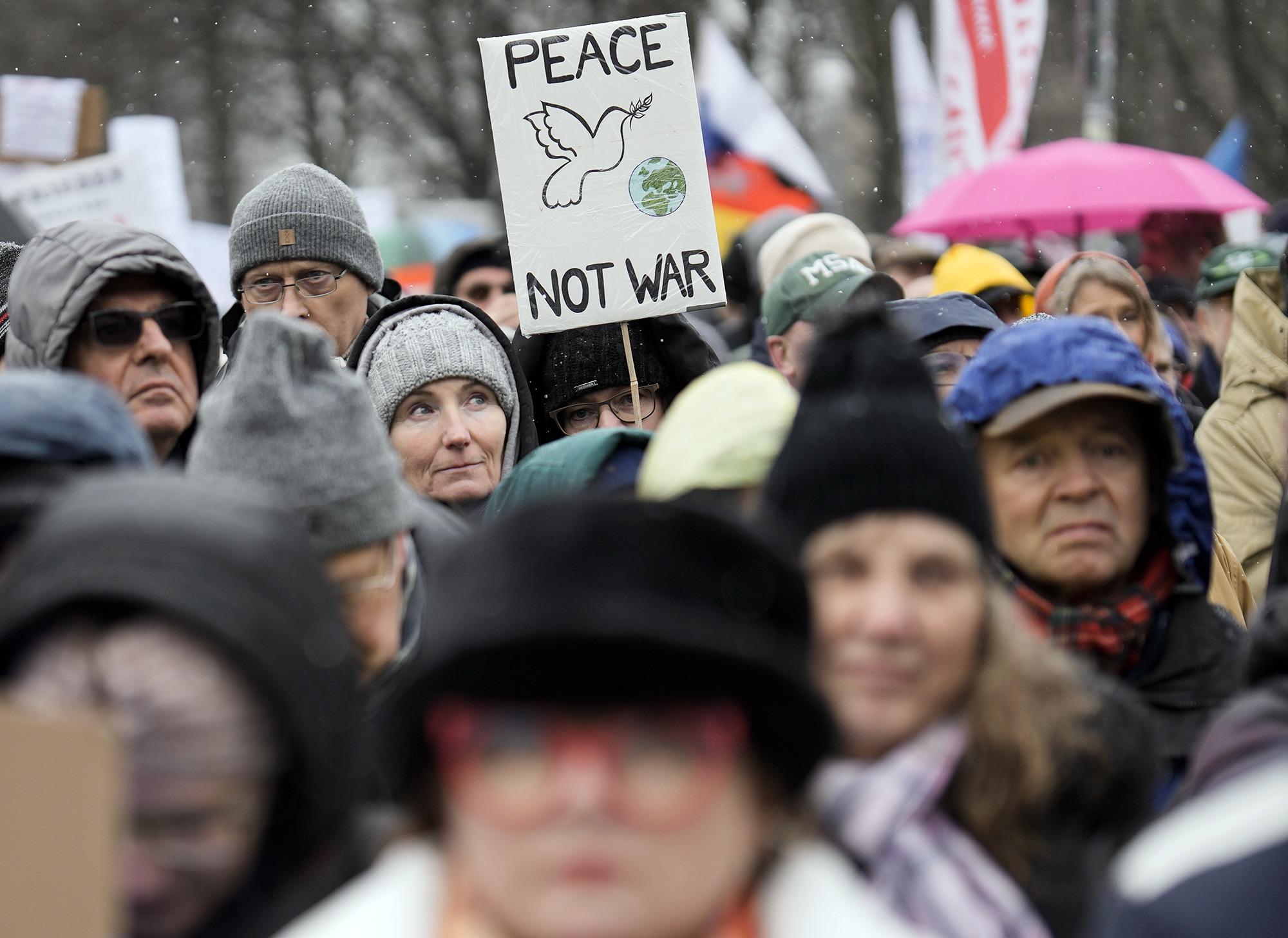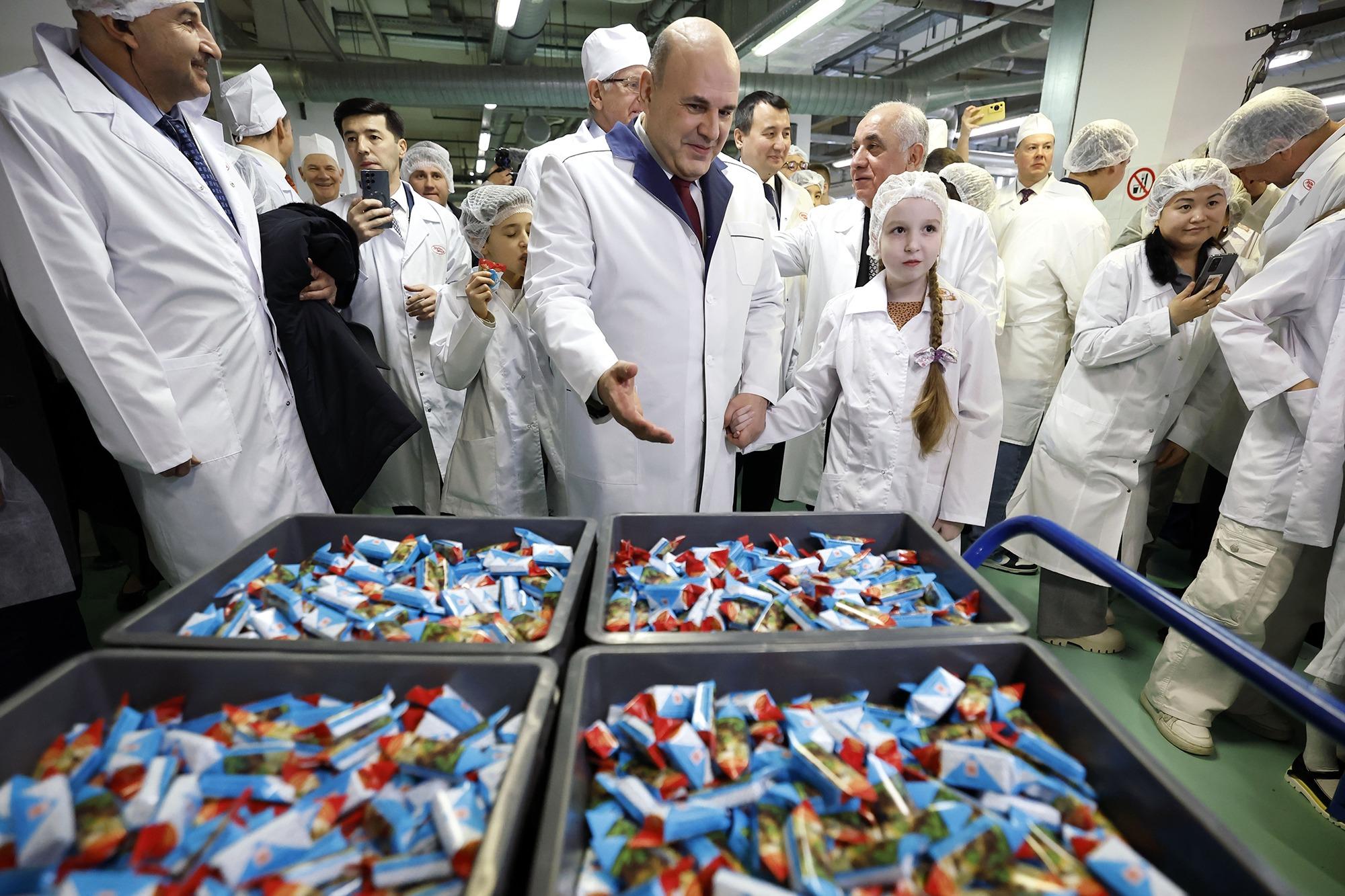Despite sanctions, country's economy registers higher GDP growth, piling more stress on Kyiv's backers
 People attend a demonstration supporting peace in Berlin, Germany, on Feb 25, 2023. The demonstrators demand that Germany stop supplying weapons to Ukraine and start negotiations with Russia. (PHOTO / AP)
People attend a demonstration supporting peace in Berlin, Germany, on Feb 25, 2023. The demonstrators demand that Germany stop supplying weapons to Ukraine and start negotiations with Russia. (PHOTO / AP)
In a widely predicted move, Russian President Vladimir Putin announced last month that he will run for a fifth term in the March 2024 presidential election.
If reelected, the 71-year-old leader, who has been in power since 2000 as president or prime minister, is expected to keep Russia on its path to pivot away from the West, experts say, while he might be ready to persist with the special military operation in Ukraine for a longer term to put mounting strain on the unity of Kyiv's Western backers.
The Kremlin's confidence is boosted by the country's better-than-expected GDP growth in the second year of Western sanctions, and experts see a promising economic development next year.
The Kremlin has been preparing for Putin's campaign all this past year, observers say, with Russian media regularly reporting on presidential administration meetings about election preparations.
During summer, Kremlin spokesman Dmitry Peskov said that Putin would easily win the 2024 election, though the latter claimed at the time that he had not yet decided if he would run.
In August, a Kremlin source told the RBC and independent Meduza news website that the goal is for Putin to win more than 80 percent of the votes, surpassing his 2018 performance.
Russian officials, including domestic policy chief Sergey Kiriyenko, have been seen at events with the heads of regional election commissions where the presidential election was discussed, The Moscow Times reported.
Oleg Ignatov, a senior analyst at the nonprofit International Crisis Group in Brussels, said the economy would be a key focus for both the Russian president and the government in the coming year.
"Revenues are growing. The sanctions have not worked. This came as a surprise even to the Kremlin itself," Ignatov said.
Huge sums of money have been invested in industry, factories are working around the clock, wages are rising, and expert forecasts say GDP growth by the end of this year will surpass 3.5 percent, higher than that of major Western countries.
"The West has strategically miscalculated," Alexander Dynkin, president of Primakov National Research Institute of World Economy and International Relations, Russian Academy of Sciences, told China Daily.
The West had hoped for an economic catastrophe in Russia after an unprecedented financial and economic war with more than 15,000 sanctions, and hoped for success of the economic blockade, said Dynkin, a key expert of the International Primakov Readings Forum, but "isolating Russia from the global market turned out to be untenable".
"New rounds of sanctions are marginal. All major and illegal restrictions have already been imposed. Therefore, I do not doubt the rationality of expectations of economic growth at a level close to 3 percent of GDP in 2024-25, which is almost twice as high as the forecast estimates for the developed countries," Dynkin said.
Feodor Voitolovsky, director of Primakov National Research Institute of World Economy and International Relations, said that since 2014, Russia has been progressively experiencing intensified sanctions from the United States and Europe, which significantly increased last year.
 Russia's Prime Minister Mikhail Mishustin (center) visits a chocolate factory as part of the Christmas Tree of Wishes charity campaign in Moscow on Dec 16, 2023. (PHOTO / AP)
Russia's Prime Minister Mikhail Mishustin (center) visits a chocolate factory as part of the Christmas Tree of Wishes charity campaign in Moscow on Dec 16, 2023. (PHOTO / AP)
Withstanding pressure
Russia was able to withstand numerous rounds of sanctions by the US and its allies, which have been and still aim to reduce the development potential of sectors of the Russian economy, primarily oriented to foreign markets, as well as to limit the access of Russian companies to external sources of financial resources and technologies, said Voitolovsky, another key expert of the International Primakov Readings Forum.
US sanctions have been applied not only to Russia, but also to countries and companies that have worked with Russian partners. The goal of such measures by Washington is to break the trade and economic interdependence of Russia and the European Union.
"In 2022-23, main victims of the restrictive measures introduced by the US and supported by the EU were not only Russia but also almost all European economies that used to depend on Russian gas and oil and other goods and its market, as well as the absolute majority of the population in the European Union faced with an unprecedented increase in inflation, which had to be extinguished by increasing credit rates," Voitolovsky said, adding that the US was able to acquire a much larger segment of the European oil market and replace Russian pipeline gas with US LNG.
Nevertheless, the Russian economy is successfully adapting to the economic and political pressure from the US and its allies — none of the catastrophic scenarios predicted by Western forecasts have come true.
The banking sector is working properly, while leading Russian companies are expanding sales in Asian markets and have learned to skirt restrictions; logistics methods have changed but are working properly; and the Russian market has not become scarce — it is saturated with goods, including high-tech products. Russia has become one of the leading global players on food and LNG markets.
This means the failure of Western restrictions, Voitolovsky said.
Experts have warned that the successful transition to a "war economy" may carry long-term risks for the Kremlin, because the military operation has required increasing amounts of resources, and military spending has surpassed social spending.
Once the conflict ends, it will take time for Russia to rebuild its economy, but Western sanctions will remain, said Alexandra Prokopenko, a nonresident scholar at the Carnegie Russia Eurasia Center.
In addition, the special military operation in Ukraine has led to a gap of around 1 million people in Russia's labor market, according to independent demographer Alexei Raksha.
This includes between 300,000 and 500,000 people who were recruited into the army during the mobilization in 2021, while fewer foreign workers were arriving in Russia, and many were reportedly considering leaving the country.
Labor shortages are usually good news for workers. Wages rise, working conditions become more bearable, and workers who are discriminated against have more chances of finding employment.
This is the case in Russia now, especially at factories associated with state defense orders, where women, the elderly and people with disabilities are more in demand than ever.
But growth in employment and income comes at a high price, as many workers need to work overtime. Some plants that produce military equipment have introduced 12-hour working days and six-day working weeks.
Increased wages
Still, many employees are pleased to be earning more. An employee at the state-owned Russian car manufacturer AvtoVAZ, who gave his name as Sergey, said: "In our production, wages have increased. This is mainly due to the appearance of an absenteeism bonus.
"Those of us who didn't quit, now work seven days a week and overtime. All this is paid at double the rate. The salaries are good. It's realistic to get paid more than 150,000 roubles ($1,660). But the work, of course, is exhausting."
Another clear change in labor relations is the exploitation of teenage labor, including in military production. Russians were well aware this happened during World War II, but it seemed unimaginable in the present day until the outbreak of the current conflict.
Across Russia, demand for 14- to 18-year-olds has increased by 60-70 percent this year, according to recruiters, facilitated by a new law allowing minors to sign work contracts without the permission of their parents or guardians. Children between 14 and 16 can work up to 24 hours per week in certain sectors, rising to 36 hours for those over 16.
While military conflicts have complicated the lives of ordinary Russians, some moneyed Muscovites are living their best life, directly benefiting from the military operation, observers say.
"Moscow is bursting with money," observer Sergey Medvedev wrote on Facebook, pointing to military deals and surging oil sales.
Writing for the Carnegie Endowment for International Peace, Denis Volkov and Andrei Kolesnikov said last month that Russians adapted to the new economic conditions "in the space of just one year".
"Most Russians understand that the conflict in Ukraine will not end soon, and they try not to focus too much on military topics or developments at the front," they wrote.
Russian society, they said, has "learned to stop worrying about the conflicts".


